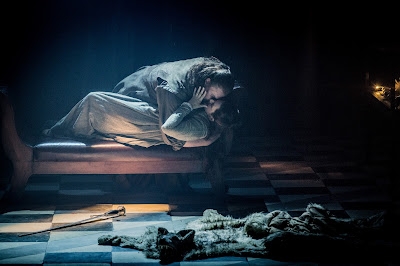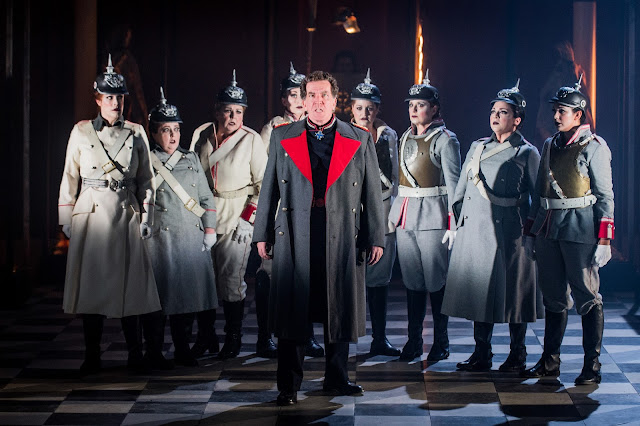Richard Wagner Die Walküre; Bryan Register, Claire Rutter, Jane Dutton, Thomas Hall, dir: Stephen Medcalf, Bournemouth Symphony Orchestra, cond: Stephen Barlow; Grange Park Opera
Reviewed by Robert Hugill on Jul 5 2017
Star rating:
Prussian militarism and strong personenregie make for an engrossing new production
Creating a new production of Wagner's Die Walküre is a significant undertaking for any opera company, but doing so in a
theatre which has only just opened after a year-long building campaign is pretty impressive. And in fact, Stephen Medcalf's new
production at Grange Park Opera, which we caught on Wednesday 5 July 2017, is quite an artistic achievement too. Designed by Jamie Vartan with lighting by David Plater, the production feature Bryan Register as Siegmund, Claire Rutter as Sieglinde, Alan Ewing as
Hunding, Thomas Hall as Wotan and Jane Dutton as Brünnhilde. Sara Fulgoni was ill, so walked the role whilst Anne-Marie Owens sang from
the wings. Stephen Barlow conducted the Bournemouth Symphony Orchestra.
Reviewed by Robert Hugill on Jul 5 2017
Star rating:
Prussian militarism and strong personenregie make for an engrossing new production
 |
| Bryan Register, Claire Rutter (photo Robert Workman) |
Jamie Varton's designs used a single set, an mid-19th century grand hall complete with balcony running round the edges. For Act One it was filled with animal and insect specimens, which match the depiction of Hunding (Alan Ewing) as a keen hunter (and obviously collector of trophies). Weapons were included in the collection too, and Nothung was displayed in a case high above. For Act Two and Wotan's domain, the objects on display had changed to artistic and cultural artefacts, with a significant display of 19th century portraiture on the walls. Very significant to the production's iconography was a huge reproduction of Anton Werner's picture Die Proklamation des Deutschen Kaiserreiches depicting the proclamation of the Second German Empire at Versailles in 1871 following the Franco-Prussian War. For the final act it was the Valkyries themselves who were initially in the glass cases, with the Ride of the Valkyries being used to drag body bags across the stage ending with the vivid image of eight body bags suspended from the now empty glass cases. Wotan (Thomas Hall) and the Valkyries were all in Prussian style uniforms including the distinctive helmets with points.
 |
| Sara Fulgoni, Thomas Hall (Credit: Robert Workman) |
Recent productions of Wagner's Ring Cycle have very much concentrated on the human aspects of the drama, often minimising the mythic elements. Stephen Medcalfe's intriguing concept was to associate these mythic elements with the rise of Prussian militarism and empire building, something which happened in parallel to Wagner's writing and first performances of the Ring Cycle. When seeing a production of a single opera from the cycle, it is often intriguing to speculated on how the director's chosen style and iconography might be expanded to encompass the whole Ring. In fact, at our visit we spent quite a long time during the dinner interval discussing just this, and we found the Medcalf's concept and iconography rich enough to be expanded.
It helped that his eye for detail in the production ensured internal consistency whilst providing many a telling theatrical moment. During the last act, when Brünnhilde has laid down and gone to sleep, Wotan put his shield by her, placing her hand resting on the shield. Then, in a final gesture covered her with his own great-coat. This made a touching dramatic picture, but had the sense of forward logic too, it would enable Siegfried on discovering Brünnhilde in Act Three of Siegfried to genuinely mistake her for a man.
 |
| Bryan Register, Alan Ewing (credit: Robert Workman) |
Bryan Register made a frank and equable Siegmund, and his vocal firmness combined with generally sunny, take-life-as-it-comes temperament rather reminded me of Alberto Remedios' performances as Siegfried and perhaps this characterisation might have been a bit more apt for Siegfried. (Remedios can be heard as Siegmund in Reginald Goodall's recording of The Valkyrie on Chandos). Certainly in Act One, Siegmund seemed entirely untroubled by the thought that he might die the following day. But Register's vocal and dramatic performance ensured that we sympathised with him. Also Register's admirable firmness of line, evenness of emission through the whole range and tirelessness made this a notable performance. He was partnered by Claire Rutter as a Sieglinde who incarnated many similar vocal virtues. Rutter sang with an admirable firmness of line, and a complexity of characterisation which made her wonderfully watchable whether singing or not. She brought a lively intelligence to the role, and the moments in Act Three when she realises the significance of her pregnancy were glorious. This was a lyric account of the role, but Rutter demonstrated that she has the power and the stamina to rise to the role's great moments, and she invested Sieglinde with a strong and troubling passion.
Thomas Hall was a complex, troubled Wotan, personal and vulnerable but was able to rise to more mythic heights when necessary. In Act Two he brought a real personal sense of involvement to Wotan's dialogues with Fricka (Sara Fulgoni / Anne-Marie Owens) and with Brünnhilde (Jane Dutton), combining nobility of purpose with human fallibility, as well as singing with an admirably flexible line. I have heard Wotan's Farewell sung better in purely musical terms, but it was Hall's combination of musicality with telling emotion which counted. The whole of this long scene was profoundly touching and a nice mix of the human and the mythic
 |
| Thomas Hall, Jane Dutton (credit: Robert Workman) |
Alan Ewing was a wonderfully uptight and controlled Hunding, fearsomely controlled with only the twitch of an arm to indicate emotion, certainly not someone I would want to get on the wrong side of. And musically he was similarly impressive, not that darkest toned of Hundings that I have come across but impressive in his incisiveness and commitment.
It was a shame that Sara Fulgoni was ill as her dramatic depiction of the role of Fricka seemed to offer an interpretation rather different to usual, but without Fulgoni's voice it is difficult to comment further except to say that Anne-Marie Owens stood in admirably.
In the final act Owens re-appeared in her regular role in the production as one of the Valkyrie along with Morag Boyle, Becca Marriott, Gemma Morsley, Tanya Hurst, Mari Wyn Williams, Lauren Easton, and Felicity Buckland. These presented a lively and entirely believable group, each distinguished by different characteristics, but communally giving us a vivid depiction of the Valkyrie's fear of Wotan.
In the pit, Stephen Barlow drew a very lyrical account of the score from the Bournemouth Symphony Orchestra. Not that it was without drama, quite the opposite, and moments like the opening of Act One and the conclusion to Act Two were very dramatic, whilst the opening to Act Three was suitably thrilling. But Barlow's approach seemed to combine a fluidity of pace (this performance never felt slow or stodgy) with an ability to bring out individual details so that there were lots of incidental orchestral felicities and moments like the Wintersturme (which was significantly slower than the surrounding material) showed signs of an intelligent re-thinking. Barlow and the orchestra's command of the large-scale architecture of the piece was equally fine, and there were no moments which dragged, each act following its own distinctive arc. Whilst the vocal performances were strong indeed, there was a sense that it was Stephen Barlow and the orchestra who knitted the performance into such a satisfying whole.
 |
| Grange Park Opera - Wagner: Die Walkure - Bryan Register, Claire Rutter, Jane Dutton (credit: Robert Workman) |
Elsewhere on this blog:
- Station of the Cross: Simon Vincent's piano work inspired by William Fairbank installation - CD review
- Complex and thoughtful: Bartosz Glowacki at Rhinegold Live - concert review
- Occasional but not negligible: Purcell's Odes and Songs from the Sixteen - concert review
- Path of Miracles: I chat to Nigel Short of Tenebrae - interview
- An enchanting beginning: Louise Alder and Joseph Middleton in Richard Strauss - CD review
- Nights not spent alone: Kitty Whately & Simon Lepper in Jonathan Dove - CD review
- Off the beaten track: Innovative multi-media Wagner museum near Dresden - feature article
- Musical comedy: Rossini's Il turco in Italia at Garsington - opera review
- Comedy of character: Britten's Albert Herring at the Grange Festival - opera review
- Vividly theatrical: Monteverdi's Il ritorno d'Ulisse at the Grange Festival - Opera review
- Home










%20Bill%20Smith_Norwich%20Cathedral.jpg)

No comments:
Post a Comment